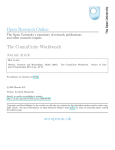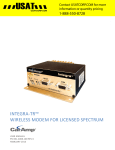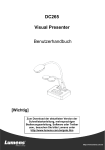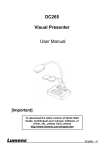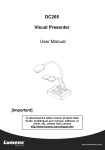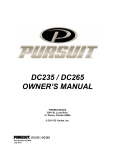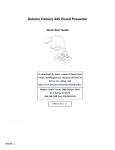Download Dual DC265C Installation guide
Transcript
DC265 / DC365 INSTALLATION & OWNERS' MANUAL In-Ceiling / In-Wall Loudspeakers DC265 / DC365 INSTALLATION Mounting Considerations Dual architectural speakers are designed to work within nearly all interior decorating schemes where in-wall or flush mounting is feasible. Wall mounted and ceiling mounted speakers should be installed away from corners or intersecting walls, and directly adjacent to the listening area. This placement gives the best audio imaging. Position your speakers symmetrically for best results. Sound Coverage and Speaker Placement Your design approach should take in to consideration the intended use of your speakers. Sound coverage and audio imaging should be viewed as seperate goals. Speaker Coverage: This installation may be desired if the speakers are intended to be used as an intercom based music system. Typical ceiling speakers should not be spaced greater then two times (x2) the ceiling height. Measure floor to ceiling and multiply by two. An example using this rule and the table below: If you had an 8 foot ceiling, a pair of speakers would be spaced 16 feet apart, which would result in a coverage area of 500 square feet. Ceiling Speaker Coverage in Square Feet # Speakers 1 2 3 4 5 6 8’ 250 500 750 1,000 1,250 1,500 9’ 325 650 975 1,300 1,625 1,950 Ceiling Height 10’ 400 800 1,200 1,600 2,000 2,400 11’ 485 970 1,450 1,930 2,410 2,890 12’ 575 1,150 2,300 2,875 3,450 4,025 Please check your intercom owners' manual to determine the correct impedance loading for multiple speakers. 2 DC265 / DC365 COVERAGE & SPEAKER PLACEMENT Sound Coverage and Speaker Placement Audio Imaging: Ceiling or wall speakers can be used as pairs for stereo or used in multiples for 5.1 to 7.1 multi-channel applications. Ideally you should place the stereo or front left and right speakers as directionally balanced as possible to the primary listening area. A common rule is to position the front speakers so that the distance between the listening position and the wall is 1.5 times the distance between the two speakers, but the speakers can be further apart if you desire a wider sound stage. In a typical audio/ video multi-channel setup, the listening position is directly facing the video source (TV or Monitor) and the center channel is on a direct plane with the listener. If the listener is positioned 15 feet away from that video source, then the optimal distance between the left and right speakers would be 22.5 feet apart (15'x1.5). Listener Equidistant Example The speaker imaging decreases rapidly the further the listener is from the speakers, so an equidistant speaker arangment for multi-channel installation is desired for the best results. Try to equalize the speakers distance so the listener is basically in the middle of the sound stage. 3 DC265 / DC365 COVERAGE & SPEAKER PLACEMENT Sound Coverage and Speaker Placement When possible, try to reduce the distance of your speaker from the audio source to achieve the best audio results. The optimum wire run should be no longer than 30 feet for the most favorable results. If you must run wire longer than 30 feet, we recommend using larger wire of 12 or 14 gauge. Among the factors to consider in the planning of your speaker placement is that the front of the speakers should be free from such obstructions as furniture or built in architecural features. High and midrange frequencies will be absorbed by fabric, carpet, curtains and soft furnisings. Walls and hard floors will reflect sound waves. Regardless of the speaker model (ceiling or wall), the speakers should not be installed closer then 3' from adjacent or intersecting walls. IMPORTANT: The DC265 is not magnetically shielded. Avoid mounting speakers closer than 20” from a video monitor or TV screen. After installation, if any video or TV screen distortion is detected, the video monitor or TV must be moved beyond the effect of the magnet motor. The magnets will distort and discolor the screen and could cause permanent damage to the picture tube. Multiple pairs of speakers placed in strategic locations within your coverage area can be a fundamental solution when designing a system that requires large coverage. Keep in mind that wire must be run to the location of the speakers. Walls, studs, ducts and joists in your home may be difficult to get around when wiring your speakers, so understanding your home's construction and properly planning your design is important. An example is a home constructed of block with limited wall depth. This would present a problem for inwall installation and wire management. 4 DC265 / DC365 INSTALLATION Installation Tips Caution: Do not attempt to connect the speakers to any source, amplifier or receiver that is turned on. Be sure the receiver is off prior to connecting the speakers. Adhere to all electrical and building code requirements for your area. The minimum mounting depth of 4" measured from the face of the wall or ceiling is needed for proper clearance. The speakers can be placed beside studs or other wall interior items but avoid near proximity to pipes, machinery and high amperage wiring. The DC265 is designed to use the wall cavity as the enclosure. It is not necessary to install an enclosure unless required to do so by local electrical or fire regulations. The mounting tab brackets incorporated into the speakers can accommodate sheet rock or wall board thicknesses of 1/2” to 1-3/8”. Spacers or longer screws can be used on thinner or thicker surfaces. Push Lock Speaker Terminals Built-in “easy turn” wall mounting tabs Adding insulation such as 3" to 4” insulation or damping material behind the speaker generally improves the sound quality. 5 DC265 / DC365 INSTALLATION Installation Tips Parallel or series wiring is not recommended for these speakers. The speakers should only be connected to receivers with 4-8 ohm amplifier loading. Avoid parallel or series wiring your Dual speakers with any other speaker type or brand. Always connect speaker wires using the correct polarity. Speaker wires are marked for polarity consistency so that you can determine the positive and negative identity of the individual wires within the molded pair insulation. Polarity is shown by either a color stripe on the insulation, by ridges molded into one side of the insulation, the color of the insulation case around the wire, or by the color type or colors of the wires/wire itself (copper or silver). Important: In order to maintain correct polarity, always connect speaker wire using the positive (+) terminal on the receiver to the positive (+) wire, and the negative (-) terminal on the receiver to the negative (-) wire. 6 DC265 / DC365 INSTALLATION Installation Guide When ceiling mounting your speakers, attempt to make the locations as symmetrical as possible. When wall mounting, carefully measure the distance from the floor to the speaker center so both speakers are the same distance from the floor. You may use the template that is included with your Dual speakers to determine the correct cut-out dimensions. Cut the hole or opening using a sheet rock saw, keyhole saw or other suitable tool. Place the speaker in the opening to verify a correct flush fit. Remove the speaker grille at this point of the installation to gain access to the screws which turn the mounting tabs that will secure the speaker to the mounting surface. The screw heads that lock the tabs can be identified by turning the speaker over and pushing on the tab. The corresponding screw head will protrude identifying which screws you will need to turn once the speaker is connected, and in the proper position within the wall or ceiling. Run speaker wires from the amplifier to the speakers. Allow an extra 2' of wire at the speaker cutout location to make installation easier. Strip and twist about 1/2” of insulation off the speaker wires. The speaker wire runs should be hidden as well as possible within the wall or ceiling and should not come in contact the speaker basket, be wrapped around the crossover network or hang loosely near a stud as vibration may cause poor sound quality. Insert the speaker into the opening cut in the wall or ceiling, slide the whole speaker into the wall cavity and center the speaker in the opening. Once the speaker wires are attached and all wire management is complete and the speaker is in the flush position, turn the screw heads associated with the tabs clock-wise to tighten the tabs against the wall or ceilings interior surface. 7 DC265 / DC365 INSTALLATION Installation Guide Test your system to insure all connections are correct and the speakers are active. These speakers are designed with adjustable tweeters. The tweeters can be rotated or pivoted if desired. The angle of the tweeters can be adjusted diametrically and to a maximum of approximately 20 degrees off axis. Do not force the pivots beyond the limits of the built in stop positions. The maximum position or stop can be felt during the adjustment. If the tweeter stops moving in that direction, then it is safe to conclude that you are at the maximum adjustment. Please do not force further movement in that direction! Replace the white (paintable) grill into the speaker baffle. If a color other than white is desired, the baffle and grille can be painted to match any interior. Most indoor paint types are suitable. Primer can be used when darker colors are required. Please avoid painting the inner black baffle or drivers as this will affect the sound quality and reduce the performance of the tweeter dramatically. When using spray method of painting, mask the interior baffle to protect the drivers from overspray. 8 DC265 / DC365 TROUBLESHOOTING Problems? Troubleshooting If you hear obvious distortion from the speakers, immediately lower the volume level of your receiver. Those sounds often indicate that either the receiver or the speaker is being overdriven, and damage can result in playing your source material (music-CDs-DVD-MP3) at high volume levels for prolonged periods of time. You should also avoid turning the bass or treble controls fully up and using your "Loudness button" when the volume level is at or above normal listening levels. Loudness Button The Loudness button on most receivers is designed to add depth when your system is being used for background music or being played at very low volume. Unnatural Sounds Distorted or unnatural sound can indicate poor connections, defective electronics, damaged source material or speaker failure. If only one of your speakers has poor sound quality, check the speaker wire and audio connections. For Your Records You must have proof of purchase to receive warranty service. Please keep your original sales receipt and be prepared to provide this receipt in the event you require service, as your original receipt is considered the best proof of purchase and indicates the date you purchased your Dual product. Dual Model _____________________________________ Dealer Name____________________________________ Dealer Phone____________________________________ Purchase Date____________________ Note: You may want to keep your original sales receipt or a photo copy with this installation/owner’s manual. 9 DC265 / DC365 WARRANTY Limited Two-Year Warranty This warranty gives you specific legal rights. You may also have other rights which vary from state to state. Dual Electronics Corp. warrants this product to the original purchaser to be free from defects in material and workmanship for a period of two years from the date of the original purchase. Dual Electronics Corp. agrees, at our option, during the warranty period, to repair any defect in material or workmanship or to furnish an equal new, renewed or comparable product (whichever is deemed necessary) in exchange without charges, subject to verification of the defect or malfunction and proof of the date of purchase. Subsequent replacement products are warranted for the balance of the original warranty period. What to do? 1. Before you call for service, check the troubleshooting guide in your owner’s manual. A slight adjustment of any custom controls or connections discussed in your instruction booklet may save you a service call. 2. If you require service during the warranty period, you must carefully pack the product (preferably in the original package) and ship it by prepaid transportation with a copy of the original receipt from the retailer to an authorized service center. 3. Please describe your problem in writing and include your name, a return UPS shipping address (P.O. Box not acceptable), and a daytime phone number with your shipment. Who is covered? This warranty is extended to the original retail purchaser for products purchased and used in the U.S.A. 4. For more information and for the location of the nearest authorized service center please contact us by one of the following methods: What is covered? This warranty covers all defects in material and workmanship in this product. The following are not covered: installation/removal costs, damage resulting from accident, misuse, abuse, neglect, product modification, improper installation, incorrect line voltage, unauthorized repair or failure to follow instructions supplied with the product, or damage occurring during return shipment of the product. Call us toll-free at 1-866-382-5476 E-mail us at [email protected] 10 Exclusion of Certain Damages: This warranty is exclusive and in lieu of any and all other warranties, expressed or implied, including without limitation the implied warranties of merchantability and fitness for a particular purpose and any obligation, liability, right, claim or remedy in contract or tort, whether or not arising from the company’s negligence, actual or imputed. No person or representative is authorized to assume for the company any other liability in connection with the sale of this product. In no event shall the company be liable for indirect, incidental or consequential damages. DC265 / DC365 SPECIFICATIONS DC265 DC365 • • • • • • • • • • • • • • • • • • • • • • • • • • • Black polypropylene woofer cone Silk dome tweeter Rotating directional tweeter Tweeter protection circuitry Built-in crossover Silver plated speaker binding posts Paintable speaker grille and frame 150 Watts Maximum Power Handling 100 Watts RMS Power Handling 89 dB SPL +/-3dB 50 Hz to 20,000 Hz 8 ohm Nominal Impedance Black carbon fiber cone Santoprene surround Rear speaker enclosure Titanium dome tweeter Rotating directional tweeter Tweeter protection circuitry Adjustable tweeter Level control Built-in crossover Gold plated speaker binding posts Paintable speaker grille and frame 180 Watts Maximum Power Handling 120 Watts RMS Power Handling 92 dB SPL +/-3dB 45 Hz to 20,000 Hz 8 ohm Nominal Impedance Dual Electronics Corp. 21318 64th Ave. South Kent, WA 98032 Toll Free: 1-866-382-5476 www.dualav.com ©2006 Dual Electronics Corp. NSA0306-V01















